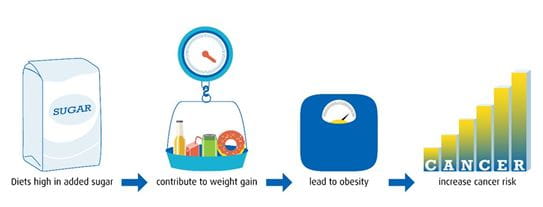The health costs of a sweet tooth
Let’s face it – it’s hard to avoid sugar
Sugar occurs naturally in foods such as fruit, milk and vegetables. But it’s also added to most of the packaged food we eat – cookies, soft drinks, candy, cakes, pastries and other sweet treats – as well as non-sweet options like sauces and condiments.
Food and drinks with added sugar have lots of calories but usually contain few nutrients – and they don’t help you feel full for long.
Sugar and cancer
While sugar as an ingredient does not increase your risk of developing cancer, what it does to your body can. Eating too much sugar means you’re more likely to put on weight. And research shows that obesity increases your risk of cancer.
The World Health Organization and leading Canadian health organizations recommend that no more than 10% of our total daily calories should come from sugar. Ideally, it should be less than 5%.
For an average 2,000-calorie-a-day diet, 10% is about 48 grams, or 12 sugar cubes.
One of the best ways to make sure you’re not eating too much sugar is to read nutrition labels. If sugar is one of the first few ingredients, the product is probably not a great choice.

Sugar has a lot of names
There are many types of sugar. If you see any of these names on a list of ingredients, you’ll know you’re eating sugar:
agave nectar, brown sugar, buttered syrup, dextrose, cane sugar, evaporated cane juice, fruit juice, lactose, galactose, maltose, raw sugar, Demerara sugar, honey, ethyl maltol, icing sugar, white sugar, date sugar, glucose, corn syrup solids, cane juice extract, fructose, carob syrup, fruit purée, maple syrup, maltodextrin, molasses, golden syrup, high-fructose corn syrup, sucrose, Turbinado sugar, treacle.
Skip the sugary drink
Sugary drinks have little or no health benefits, but Canadians sure drink a lot of them. In fact, sugary drinks are the single greatest contributor of sugar in our diets!
Sugary drinks include:
- pop or soft drinks
- energy and sports drinks
- flavoured waters
- sweetened coffees and teas
- flavoured milk
- drinkable yogurt
- fruit drinks
- 100% fruit juice
